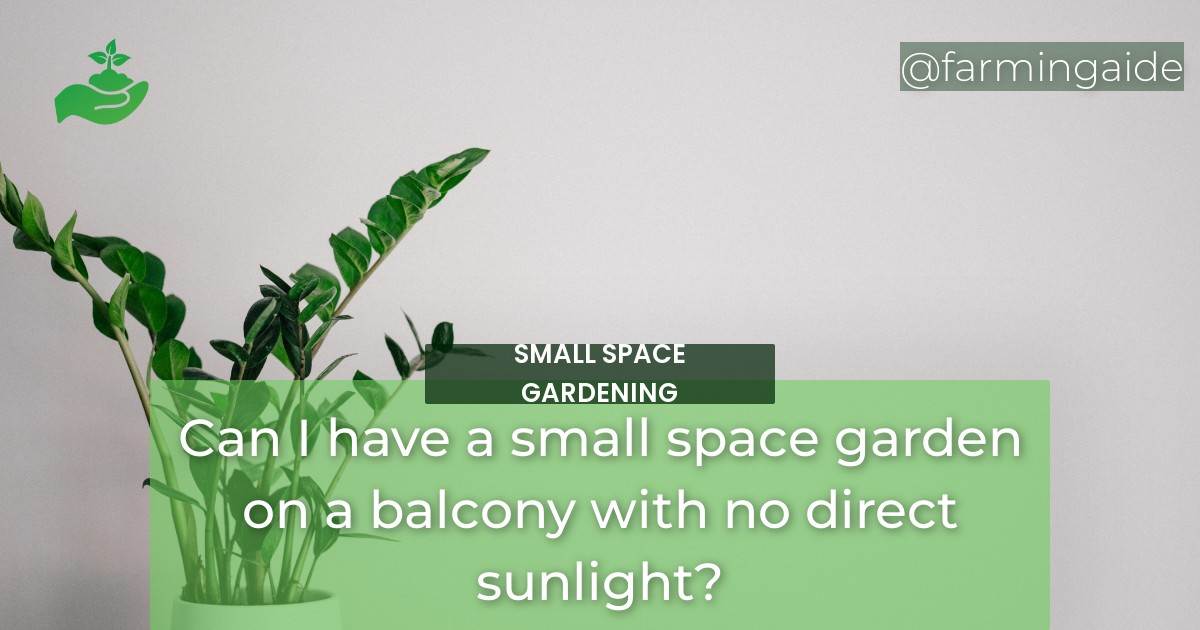Small space gardening on shaded balconies is possible even without direct sunlight. However, there are certain factors to consider before starting a balcony garden. The amount of space available, the sunlight exposure, climate and weather conditions, and soil quality and drainage are some of the key factors that must be considered before planting anything on your balcony. Choosing the right plants that can survive in shaded areas is also important. Shade-loving plants, plants that thrive in containers, compact and dwarf varieties, and plants that require less sunlight are some of the best options for small shaded balconies.
Factors to Consider
Amount of space available
Before starting a garden on your shaded balcony, it’s important to first measure the space available. Consider the number and size of plants you want to grow, and choose plants that can grow within the available space.
Sunlight exposure
While direct sunlight is not necessary for a small space balcony garden, some amount of sunlight is still needed for photosynthesis. Consider the amount of sunlight your balcony receives throughout the day and choose plants accordingly.
Climate and weather conditions
The climate and weather conditions in your area should also be considered when choosing plants for your shaded balcony garden. Choose plants that can thrive in the given climate and can survive extreme weather conditions.
Soil quality and drainage
The quality of soil and drainage are crucial for the success of any garden, including a small space balcony garden. Make sure that the soil you use is of good quality and has proper drainage to prevent waterlogging and root rot.
Choosing the Right Plants
Shade-loving plants
There are several plants that can thrive in shaded areas. Some of the best options for small shaded balconies include ferns, begonias, impatiens, hostas, and heucheras.
Plants that thrive in containers
Plants that thrive in containers are also great for small space balcony gardens. Some of the best options for shaded areas include petunias, pansies, and geraniums.
Compact and dwarf varieties
Compact and dwarf varieties of plants are perfect for small space balcony gardens. These plants can grow well in small containers and require less space. Some of the best options for shaded areas include dwarf azaleas, compact hydrangeas, and dwarf Japanese maples.
Plants that require less sunlight
Plants that require less sunlight are perfect for shaded balcony gardens. Some of the best options include English ivy, snake plant, and peace lily.
ALSO READ
Container and Soil Preparation
Choosing the right containers
The right containers are crucial for small space balcony gardens. Choose containers that are suitable for the size of the plant and have proper drainage.
Drainage and soil preparation
Proper drainage and soil preparation are important for the success of any balcony garden. Make sure that the containers have proper drainage and the soil has good quality and texture. Adding organic matter like compost can also help improve soil quality.
Fertilization and watering
Regular fertilization and watering are important for the growth of plants. Use organic fertilizers and water the plants regularly, but make sure not to overwater them as it can lead to root rot.
Care and Maintenance
Regular pruning and grooming
Regular pruning and grooming are important for the health and appearance of the plants. Remove dead and damaged leaves, and prune the plants to maintain their shape and size.
Pest and disease management
Pests and diseases can be a problem for any garden. Regularly check the plants for any signs of pests or diseases, and take necessary steps to manage them.
Nutrient supplementation
Plants require nutrients for their growth and development. Use organic nutrient supplements like compost and manure to provide the necessary nutrients to the plants.
ALSO READ
Conclusion
Summary of key points
- Small space gardening on shaded balconies is possible, even without direct sunlight.
- Consider factors like space availability, sunlight exposure, climate and weather conditions, and soil quality and drainage before starting a balcony garden.
- Choose the right plants like shade-loving plants, plants that thrive in containers, compact and dwarf varieties, and plants that require less sunlight.
- Proper container and soil preparation, fertilization, and watering are important for the success of any balcony garden.
- Regular pruning and grooming, pest and disease management, and nutrient supplementation are important for the health and appearance of the plants.
Inspiration for your shaded balcony garden
A shaded balcony can be a beautiful and relaxing place with the right plants and care. Get inspired by the many plants that can thrive in shaded areas and create a beautiful and vibrant balcony garden.


